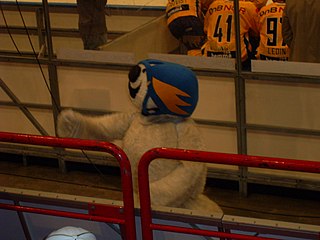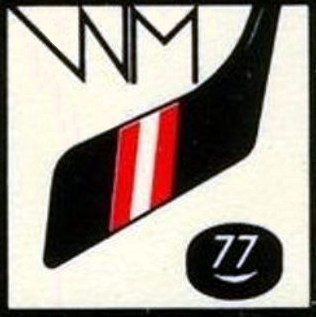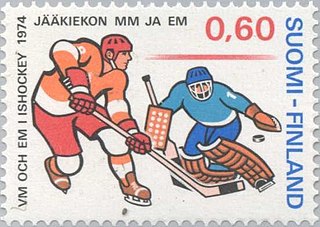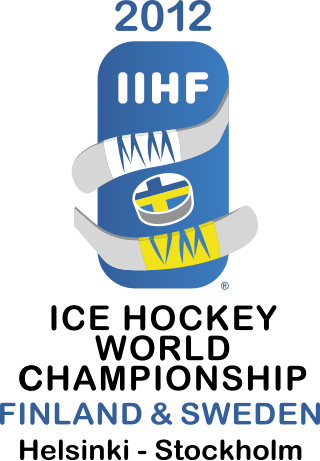
Timo Juhani "Juti" Jutila is a retired Finnish ice hockey defenceman.

The 2008 IIHF World Championship was played between May 2 and May 18, 2008 in the Canadian cities of Halifax and Quebec City (Quebec). The two venues were the Halifax Metro Centre and the Colisée Pepsi. The tournament was won by Russia which claimed its first gold medal since 1993.

The 1995 Men's Ice Hockey World Championships was the 59th such event sanctioned by the International Ice Hockey Federation (IIHF). Teams representing 39 countries participated in several levels of competition. The competition also served as qualifications for group placements in the 1996 competition.

The 1965 Ice Hockey World Championships took place in Hakametsä, Tampere, Finland, 3–15 March. Eight teams took part, each playing each other once. The Soviets became world champions for the fifth time, winning all of their games. This also counted as their ninth European title, with the Czechs finishing second and the Swedes third. For the third straight year Canada finished fourth. The tournament employed new tie-breaking rules, which some believed were supposed to be in place for the Innsbruck Olympics. To decide medals priority would be given to the team who won the head-to-head game, unless they tied, or more than two teams were tied. In those two cases goal differential would be used, but only the goal differential between the top four teams.
The 1996 Men's Ice Hockey World Championships was the 60th such event sanctioned by the International Ice Hockey Federation (IIHF). Teams representing 36 countries participated in several levels of competition, with Slovakia making their first appearance in the top Champions Group A, in their fourth tournament since the dissolution of Czechoslovakia and the formation of the separate Czech Republic and Slovakia men's national ice hockey teams. The competition also served as qualifications for group placements in the 1997 competition.

The 1994 Men's Ice Hockey World Championships was the 58th such event sanctioned by the International Ice Hockey Federation (IIHF). Teams representing 35 countries participated in several levels of competition, with an additional two national teams failing to advance from a mid-season preliminary qualifying tournament. The competition also served as qualifications for group placements in the 1995 competition.
The 1992 Men's Ice Hockey World Championships was the 56th such event sanctioned by the International Ice Hockey Federation (IIHF). Teams representing a record 32 countries participated in several levels of competition. The competition also served as qualifications for group placements in the 1993 competition.

The 1991 Men's Ice Hockey World Championships was the 55th such event sanctioned by the International Ice Hockey Federation (IIHF), and at the same time served as the 66th and last Ice Hockey European Championships. Teams representing 25 countries participated in several levels of competition. The competition also served as qualifications for group placements in the 1992 competition.
The 1987 Ice Hockey World Championships was the 52nd such event hosted by the International Ice Hockey Federation. It was also the 63rd European Championships. Teams representing 28 countries participated in four levels of competition.
The 1982 Ice Hockey World Championships took place in Finland from the 15 April to the 29 April. The games were played in Helsinki and Tampere with eight teams playing a single round-robin, followed by the top four teams playing each other once more. This was the 48th World Championships, and also the 59th European Championships of ice hockey. The Soviet Union became World Champions for the 18th time, and also won their 21st European Championship.
The 1978 Ice Hockey World Championships took place in Prague, Czechoslovakia from 26 April to 14 May. Eight teams took part, with each team playing each other once in the first round, and then the four best teams meeting in a new round. This was the 45th World Championships, and also the 56th European Championships. The USSR won for the fifteenth time, narrowly defeating the incumbent Czechoslovaks.

The 1977 Ice Hockey World Championships took place in Vienna, Austria from 21 April to 8 May. Eight teams took part, first playing each other once, then the four best teams advancing to a new round. The tournament was also the 55th ice hockey European Championship. Czechoslovakia won for the fifth time, and second in a row, claiming their 14th and final European title as well.
The 1976 Ice Hockey World Championships were the 43rd Ice Hockey World Championships and the 54th European Championships in ice hockey. The tournament took place in Poland from 8 to 25 April, and the games were played in Katowice. Eight teams took part in the main tournament, with each team first playing each other once. The four best teams then took part in a medal play off, and the teams placed 5–8 took part in a relegation play-off. The teams took the results from the first round through to the second round with them.

The 1974 Ice Hockey World Championships were the 41st Ice Hockey World Championships and the 52nd European Championships in ice hockey. The tournament took place in Finland from 5 to 20 April and the games were played in the capital, Helsinki. Six teams took part in the main tournament, all playing each other twice. The Soviet Union won the world championships for the 13th time, and also won their 16th European title.

The 2010 IIHF World Championship was the 74th IIHF World Championship, an annual international ice hockey tournament. It took place between 7 and 23 May 2010 in Germany. The games were played in the Lanxess Arena in Cologne, SAP Arena in Mannheim, and one game at Veltins-Arena in Gelsenkirchen. The Russian team was the defending champion, having won the previous two championships.

The 2012 IIHF World Championship was the 76th IIHF World Championship, an annual international ice hockey tournament. It took place between 4–20 May 2012 in Helsinki, Finland and Stockholm, Sweden. This tournament determined the countries' seeding for the men's Olympic Ice Hockey tournament in Sochi for the 2014 Winter Olympics, and for all countries participating in the qualification program leading up to the Olympics.
The 1979 IIHF European U18 Championship was the twelfth playing of the IIHF European Junior Championships.
The 1985 IIHF European U18 Championship was the eighteenth playing of the IIHF European Junior Championships.
The 1995 IIHF European U18 Championship was the twenty-eighth playing of the IIHF European Junior Championships.
The 1996 IIHF European U18 Championship was the twenty-ninth playing of the IIHF European Junior Championships.









